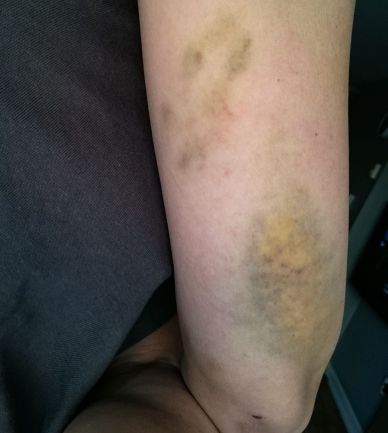Last week, I was physically restrained and forcibly confined by family members when I was demonstratively calm, sane, and logical, simply getting up to go home after explaining calmly that I was getting up to go home. They screamed irrational soap-opera-y things like “I’d die for you!” that seemed to be completely disconnected from reality. My limbs and torso were pinned to the wall, and I could barely breathe with their shoulder shoved in my mouth.
I didn’t try throwing the small one to the ground and kicking the male one in the testicles to get free. I stood limp and verbally negotiated because I knew any marks on them may be used to justify restraining me after the fact. At no point did I thrash, flail, ram, or shove. Those bruises you see below were made simply from them holding me against the wall so violently so long.
I gave them several warnings before I moved against the restrain to grab my phone to call 911. Cops came and left without me even though they repeatedly tried and failed to get a promise of my safety from my captors. I made my escape with my shoes in hand when the captors fell asleep.


After I got home, I had this very strong desire to stay silent about it, and that’s when I knew I had to write this piece. There are a ton of articles on why victims/survivors of violence stay silent. One common thread seems to be the responses from their friends and family’s ill-prepared, albeit well-intended, responses. So I want to take this opportunity to encourage us to have a little preparation so our actions don’t betray our good intentions when/if the time comes.
To get this started, below are some things I noticed solely based on my own experience. This post is by no means meant to be full or comprehensive and is not meant to replace a professional advice.
When a victim of violence comes to us, I suggest we focus on listening. We are human, and we get these strong desire to know details so we can decide for ourselves if we “accept” the story. Like “What happened exactly?” “What led up to it though?” “You sure you didn’t say anything to trigger it?” “Memory is a funny thing.” We have to remember we can’t be a judge and a friend at the same time. We have to keep recommitting to being a friend.
Those of us who find it hard to operate without all the details, let me make this suggestion to you. What matters to you at this moment is how your friend experienced the event, not every little details of everything that happened concurrently. You don’t care, for instance, about the size of litter the rabbit next door had that night. From that view point, everything you need is in the words and also in the omissions of your friend’s story. So keep listening intently.
I think it’s important to be aware of questions and comments that victim-blames, which we are often unaware. Not all victim-blame looks like “What did you do to trigger it?” More subtly, “I’m sure they remember it differently,” “Memory is not linear,” “It’s over. No one else’s thinking about it any more,” “Look forward, not back,” and “You need to forgive them.” Sure sometimes in special cases this is what the victim needs to hear as reality checks. But I raise caution that “devil’s advocate” and “reality check” are frequently used to justify our desire to hear our own voices instead of coming from a calm and educated assessment of the person’s mental state and suitable journey to healing.
On that same note, did you know we very often defend the perpetrators? We were raised to be fair and try to see things from different perspectives, and this slips right out of our mouths if we aren’t mindful. “Even parents are humans. They just made a mistake.” “Family loves you. No way they meant to hurt you.” “They must have had a good reason.” “We don’t know what they were really thinking, do we?”
For some reason, a lot of us believe it’s helpful to make light of an experience. I’ve heard “Oh put some spit on it and suck it up!” shouted out triumphantly to a young man suffering a devastating heartbreak. Some victims battle with their own disbelief and denial. The last thing they need is for us to make them question their experience or the severity of it. “I’ve heard worse.” “Oh, my family beat me up too. No big deal.” “That’s nothing. You should see my bruise from my hockey game.” “I remember my friend’s mom. Now, THAT was domestic violence.” “Be positive. Some people don’t even have a family.” “Nothing ice cream can’t fix.”
Focusing on listening is also helpful in knowing exactly how they are feeling so we can respect it. It’ll be confusing for pronouns, but let me tell you a story about my experience as a victim. I’ve had well-intending people say things like “After what you went through, a hug is probably not what you want” and “I’m angry on your behalf.” I don’t know why they didn’t ask me and let me tell them if I wanted a hug (yes) and if I’m angry (I take great pride in the fact I’m not angry in the slightest). I encourage people to remember to respect a person’s own voice in any situation for anyone but especially those who just had their autonomy disturbed.
And, the easiest pitfall of all, let’s remember not to start offering them solutions and opinions without being asked. “Think of something you love.” “It’s over, isn’t it? Look forward not back.” “I know a great counsellor you should see.” “Do you meditate/exercise/journal?” Or the ones where we try to be subtle and gentle but end up being passive-aggressive, like “I know someone who’s gone through that, and they found yoga to be very helpful.”
Every human has this strong desire to be important, and it gets in the way of setting ourselves aside and helping a friend. Let me rephrase. Wanting to help is awesome. Deciding what that help should look like robs the friend of autonomy and control. So how do we know what help they want? If they came to us to talk, my guess is they want to be listened to. If listening alone doesn’t feel like enough and we feel like we need to say something, that’s a prime example of a human struggle: our own issue with our ego getting in the way of being a good friend.
Now, this has been a bit of a long list. It’s probably easier to think about what to do than what not to do.
If you ask me what to say to a victim of violence, I’d say “Say nothing. Just nod and listen. Those of us who are trained in active listening, listen and validate. It’s not up to us to decide when we should start talking. When it’s time for us to say something, they’ll explicitly let us know.” (with the exception of discussing making a police report in a time-sensitive matter or when someone is in danger, of course.) We are human, and we will always and repeatedly get the urge to start talking to satisfy our self-importance. We need to recommit over and over to feed our friend’s need over our own.
What I’m suggesting here is really hard. It goes against all our habits and natural urges, and we seldom have opportunities to practice. But I think we can try.